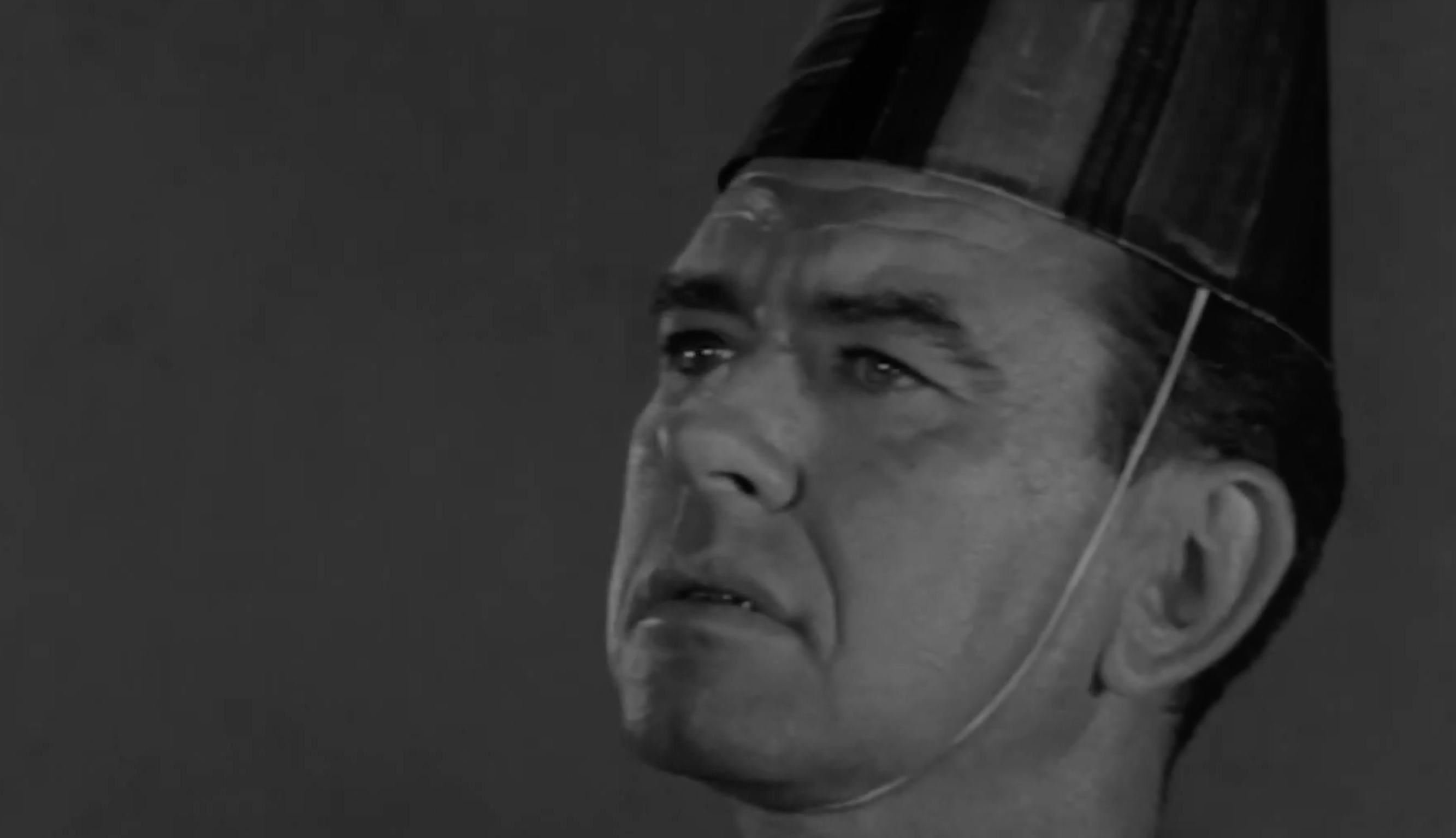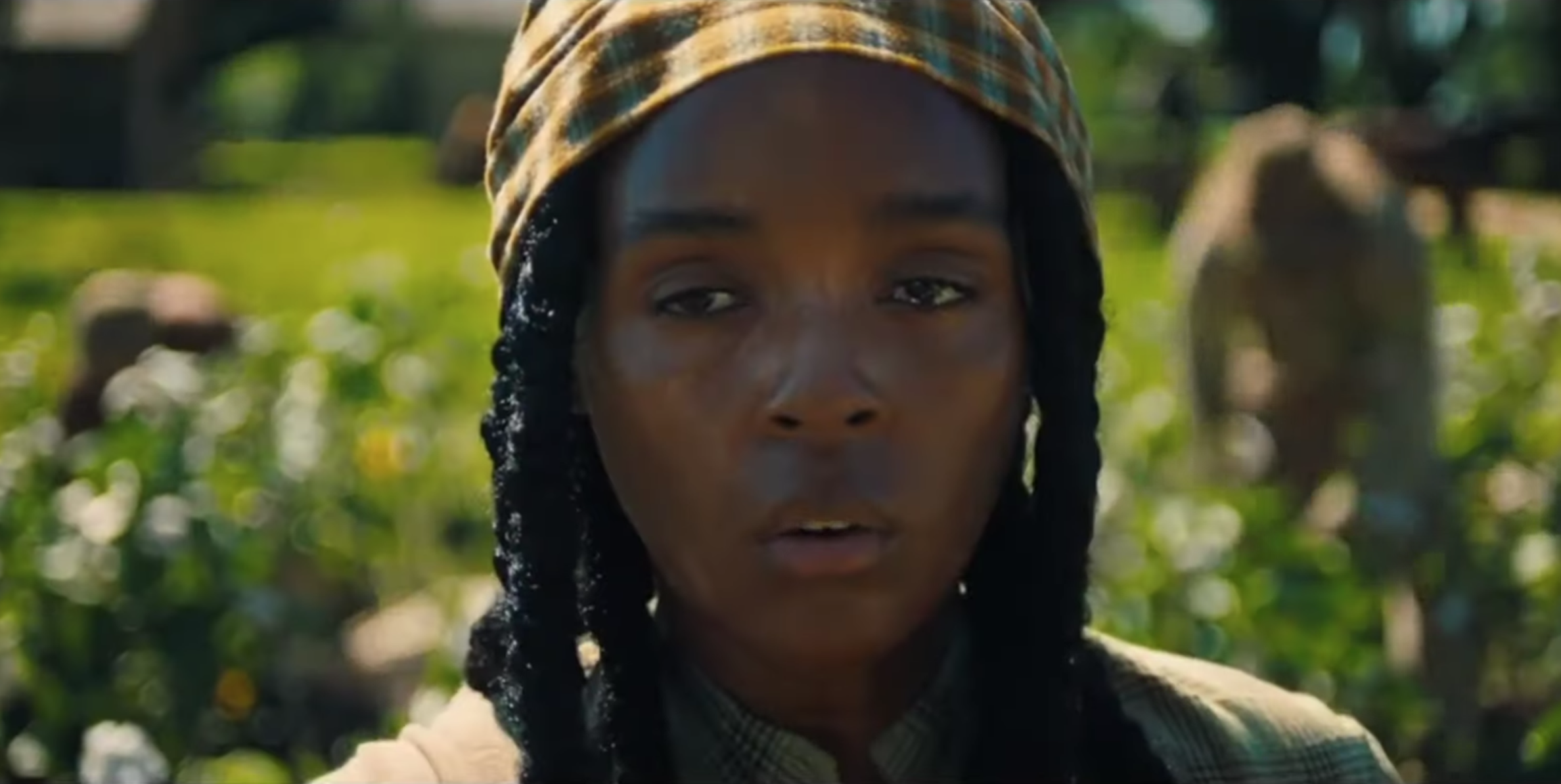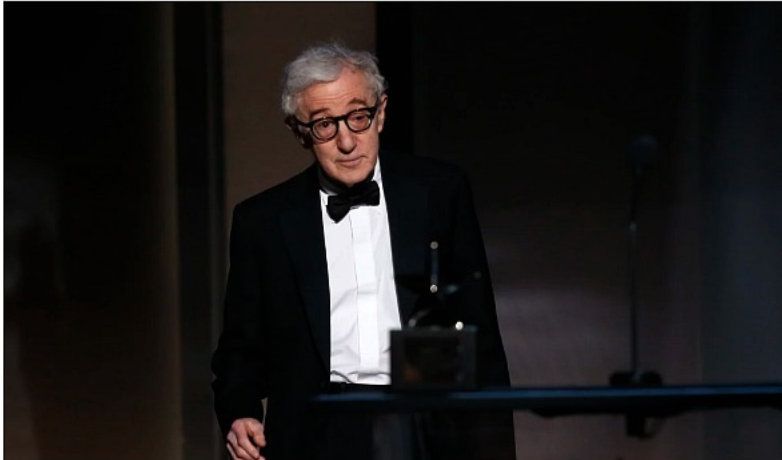Daily
Good Film, Tough Break
I’m very sorry that Rod Lurie‘s The Outpost, which had been scheduled to debut at South by Southwest on 3.14 with a follow-up on 3.17, has taken a COV-19 torpedo along with the whole SXSW ship. Yes, Rod and I are friendly but this is nonetheless a strong, vital and worthy film, and it would have been suitably launched had things gone off as planned. Life is unfair.
Early last November I caught a not-quite-finished version. A U.S. forces-vs.-the-Taliban war flick based on Jake Tapper’s book, it’s a rousing, highly emotional drill into another tough battle that actually happened, and another example of the kind of combat flick to which we’ve all become accustomed — one in which the U.S. forces get their asses kicked and barely survive.
Tapper’s same-titled book, published in 2013, is about the ordeal of U.S. troops defending Combat Outpost Keating. Located at the bottom of a steep canyon and absurdly vulnerable to shooters in the surrounding hills, the outpost was brutally attacked by Taliban forces on 10.3.09. For a while there it was very touch-and-go. The base was nearly overrun. Eight Americans and four Afghans defenders were killed.
Staff Sergeant Clint Romesha and Specialist Ty Michael Carter (respectively played in Lurie’s film by Scott Eastwood and Caleb Landry Jones) were awarded the Medal of Honor.
The Outpost starts off, naturally enough, with a subdued queasy feeling of “okay, how long before the bad stuff starts?” What happens is that things start to go wrong vaguely, gradually, in small measures. Then it upshifts into unsettling (a name-brand actor buys it) and then bad to worse, and then worse than that. And then the bracing, teeth-rattling 30- to 40-minute finale.
Lone Survivor, Hamburger Hill, Black Hawk Down, The Hurt Locker, In The Valley of Elah, Platoon, We Were Soldiers, Pork Chop Hill — American forces go to war for questionable or dubious reasons and the troops engaged get shot and pounded all to hell. Those who barely survive are shattered, exhausted, gutted. War is bad karma.
It just occured to me that one of the things I loved about Zero Dark Thirty, which is not about the military but the intelligence community, is that it ends with a feeling of modest satisfaction — bad guy smoked, mission accomplished, all is well.
I know I was expected to feel a similar kind of satisfaction from Clint Eastwood‘s Heartbreak Ridge, but I didn’t.
Variety‘s Steven Gaydos, posted last November: “Thanks for calling attention to this terrific film that packs a wallop. Really an edge of the seat experience from start to finish and deeply moving as well. Very Charge of the Light Brigade in that ‘military intelligence’ once again proves oxymoronic and brave young souls are left to figure a way to save each other from catastrophe. Heroes.”
SXSW Halted By Excessive Caution, Paranoia
South by Southwest is the latest festival to fold its tent over fears of COVID-19. The annual film and music festival would have happened between Friday, 3.13 and Saturday, 3.21. How serious is the threat in Texas? Not very. It’s slight, in fact, but all those big companies panicked and bailed. Hollywood Elsewhere will boldly fly to Austin anyway to visit my son Dylan, who recently moved there from the Bay Area.

Victory For Obstinate Wokester Bullies
Following Thursday afternoon’s walkout the Hachette Book Group announced today that it has capitulated to the wokester Khmer Rouge by deciding to not publish Woody Allen’s memoir, “Apropos of Nothing.”
“The decision to cancel Mr. Allen’s book was a difficult one,” senior vp of communications Sophie Cottrell said in a statement. “At HBG we take our relationships with authors very seriously, and do not cancel books lightly. We have published and will continue to publish many challenging books. As publishers, we make sure every day in our work that different voices and conflicting points of views can be heard.
“Also, as a company, we are committed to offering a stimulating, supportive and open work environment for all our staff. Over the past few days, HBG leadership had extensive conversations with our staff and others. After listening, we came to the conclusion that moving forward with publication would not be feasible for HBG.”
Translation: “At HBG we obviously don’t take our relationships with authors all that seriously or we wouldn’t have deep-sixed Woody Allen‘s book. The bottom line is that we are open to cancelling books if the Khmer Rouge doesn’t approve of their content. We are living through a period of wokester blacklisting and career cancellings, and we feel it is better to try to get along with these totalitarian goons than to butt heads.”
Allen obviously needs to simply self-publish. It would almost certainly become a best-seller.
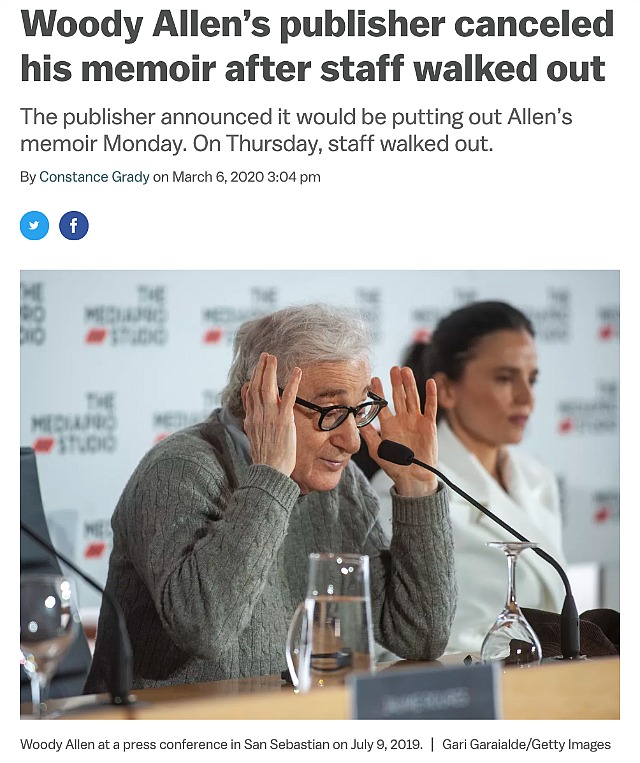
Warren Torpedoed Herself
Amid a torrent of laments about how Elizabeth Warren was defeated by sexism (which was certainly a factor in her campaign’s collapse), here’s a candid, splash-of-cold-water-in-the-face assessment by reason.com’s Katie Herzog:
Excerpt #1: “Warren could have focused on the working class; instead, she focused on the wokest class. She advocated for social positions that may resonate with highly educated, largely white activists, but just don’t appeal to a broad base of Americans across race and class. She talked about nonbinary driver’s licenses and advocated for trans women to play women’s sports and used the term ‘traffic violence‘ when the rest of us simply say ‘car crash.’
“She’s out of touch — or at least, her advisers are — and there aren’t enough Oberlin grads for her to win Ohio, much less the swing states that will likely determine the outcome of the 2020 race. So here’s why I didn’t vote for Elizabeth Warren: Because she would have given us four more years of Trump. That isn’t sexism; it’s math.”
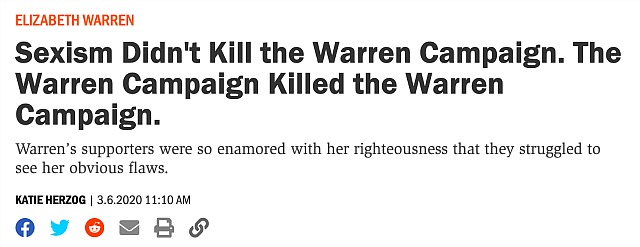
Excerpt #2: “Warren’s followers are both primed to see sexism everywhere and so enamored with their candidate — so sure of her (and their own) righteousness — that they are unable to see any of the flaws that are so apparent to anyone outside their bubble.”
Excerpt #3: “Some people seem to think it’s just obvious: If a man with Warren’s qualifications, intellect, and talent ran for office, he would have won. That may be true, although the results of the last election make me fear that qualifications, intellect, and talent don’t matter all that much in American politics.
“So here’s an alternate explanation: Elizabeth Warren didn’t lose this race simply because of sexism but because she made a series of political miscalculations, starting with the disastrous unveiling of her DNA test, which managed to anger progressives and make conservatives point and laugh. Then there was her refusal to go on the most popular cable news network in America in order to make a political point, the condescending manner in which she spoke about voters she disagreed with, her bungled Medicare for All plan, and the fact that she positioned herself to split the progressive vote with Bernie Sanders — a candidate with grassroots momentum and a campaign that has been ongoing since 2015.
“Had Warren pitched herself as a capable, qualified, less ancient and more moderate Democrat instead of Bernie Lite, it’s possible it would be her running against him right now instead of Joe Biden.
Excerpt #4: “But then she pivoted from the reformer who went after banks and stood up for the consumer into the sort of social media justice warrior who thinks she speaks for marginalized people while actually speaking over them. Despite this ill-advised rebranding, she still had plenty of ideas that I liked, from universal preschool to boosting small business to ending for-profit prisons and getting rid of the Electoral College. But her good ideas were too easily overshadowed by her bad ones.
“Take, for instance, the LGBTQ town hall (which was a bad idea in the first place). Warren was asked by a 9-year-old trans boy named Jacob what she, as president, would do to keep kids like him safe. Instead of telling him the truth (‘Jacob, bullying is sort of a local issue but I recommend a kickboxing class’), she said that she would let this 9-year-old kid vet the next secretary of education. This may have played well in that room, but she wasn’t running to be the president of the Gay-Straight Alliance; she was running to be president of the United States.”
Seeing This Tonight
Eliza Hittmann’s Never Rarely Sometimes Always (Focus Features, 3.13 / nationwide on 4.3) was hailed during Sundance ’20 as the American answer to Cristian Mungiu‘s Four Months, Three Weeks and Two Days. Pic stars the Mary Elizabeth Winstead-resembling Sidney Flanigan as a pregnant teenager and Talia Ryder as her cousin. The story is about their trek from rural Pennsylvania to New York City to find a safe abortion clinic.
“Hittman’s work as a filmmaker is always understated, remarkable in its precision and honesty in dealing with serious issues. Never Rarely Sometimes Always nails the troubling reality of reproductive rights in America today, highlighting how few options are available to vulnerable women. There’s a sense of dread which haunts the film as its teenage protagonists attempt to navigate the complex healthcare system while also dealing with predatory men. But there’s not an ounce of melodrama to be found.” — Little White Lies‘ Hannah Woodhead, 1.31.20.
Plantation Pablum
It would appear that Gerard Bush and Christopher Renz‘s Antebellum (Lionsgate, 4.24) is a female-branded revisiting of Twelve Years A Slave by way of H.G. Wells. Successful author Veronica Henley (Janelle Monae) suddenly becomes a slave in the cotton fields after time-travelling back to the Antebellum pre-Civil War South. The trailer tells us, however, that it’s Veronica’s fate “to save us from our past.” So she’s going to overturn slavery in the same way that Rod Taylor lead an Eloi rebellion against the Morlocks? Or lead a Spartacus-like revolt a la Birth of a Nation? Or maybe a little Harriet action? Or transport her plantation pallies back to 2020 and find them jobs in online publishing?
Blacklisting Thugs Stage Anti-Woody Walkout
The Daily Beast is reporting that “some” employees of the Hachette Book Group “walked out” of the publisher’s U.S. offices today in protest of the company’s decision to publish Apropos of Nothing, a new memoir by Woody Allen. According to the story, this cabal of #MeToo blacklisters has “been furious” with a decision by Hachette imprint Grand Central Publishing to release Allen’s book “despite allegations that Allen molested his adopted daughter Dylan Farrow.”
This is why everyone hates the wokester Khmer Rouge and the whole cancel-culture mentality. Because they’re totalitarian brutes at heart, and because in this instance they (the Hachette squad that walked out, I mean) are illogically opposed to what is indicated by the facts. This is one instance in which “believe the victim” is a highly questionable guideline.
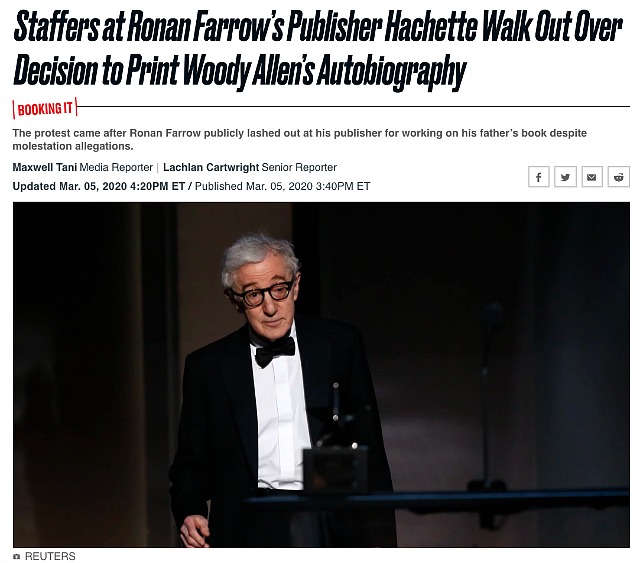
Here, for the 19th time, is the HE argument:
(1) There is no evidence to support Dylan’s claim. But there’s a fair amount of evidence and ample indications that Mia Farrow, enraged by Woody’s romance with Soon-Yi Previn, made it all up to “get” Woody during an early ’90s custody battle, and as part of this determination coached Dylan to make the claims that she did. I happen to personally believe this scenario. There’s simply no rational, even-handed way to side with the “I believe Dylan Farrow” camp.
(2) If after reading Moses Farrow’s 5.23.18 essay (“A Son Speaks Out“) as well as Robert Weide’s “Q & A with Dylan Farrow” (12.13.17) and Daphne Merkin’s 9.16.18 Soon-Yi Previn interview…if after reading these personal testimonies along with the Wikipedia summary of the case you’re still an unmitigated Dylan ally…if you haven’t at least concluded there’s a highly significant amount of ambiguity and uncertainty in this whole mishegoss, then I don’t know what to say to you. There’s probably nothing that can be said to you.
(3) Excerpt from Yale–New Haven Hospital Child Sexual Abuse Clinic report (issued in 1993): “It is our expert opinion that Dylan was not sexually abused by Mr. Allen. Further, we believe that Dylan’s statements on videotape and her statements to us during our evaluation do not refer to actual events that occurred to her on August 4th, 1992.
(4) “In developing our opinion we considered three hypotheses to explain Dylan’s statements. First, that Dylan’s statements were true and that Mr. Allen had sexually abused her; second, that Dylan’s statements were not true but were made up by an emotionally vulnerable child who was caught up in a disturbed family and who was responding to the stresses in the family; and third, that Dylan was coached or influenced by her mother, Ms. Farrow. While we can conclude that Dylan was not sexually abused, we can not be definite about whether the second formulation by itself or the third formulation by itself is true. We believe that it is more likely that a combination of these two formulations best explains Dylan’s allegations of sexual abuse.”
Twist Endings Are A Prison Cell
When did the near-dictatorship of twist endings — the all-but-mandatory belief in the necessity of “holy shit, didn’t see that one coming!” finales — sink into the minds and souls of screenwriters, directors, producers and studio chiefs? Because outside the realm of modestly proportioned personal relationship dramas like The Way Back or the forthcoming Never Rarely Sometimes Always, it’s a very rare thing to not encounter a twist ending of some kind. Especially in the genre, thriller and fantasy arenas.
I only know that as God is my father, witness, co-partner and cruel taskmaster I’ve come to really and truly hate this affliction, this cancer, this oppression, this entrapment.
People have been bemoaning the twist syndrome for a long while, I realize, but where did it all begin? With O. Henry, right? Rod Serling‘s The Twilight Zone (’59 to ’64), the episodes of which almost always ended with a twist, is also partly to blame. Along with M. Night Shyamalan‘s The Sixth Sense, of course. I only know that this feeling of being cornered and suffocated by twist endings (like the way The Invisible Man ended) is awful. I’m sure there are many exceptions to the rule, but like to assemble a list of significant 21st Century genre films that didn’t end with (a) a twist or (b) a set-up for a sequel.
CG Action in the North Atlantic
Remember the mostly organic realism of Saving Private Ryan (’98)? Well, you can forget that aesthetic as far as Aaron Schneider‘s Greyhound (Sony, 6.12) is concerned. Yeah, it’s another Tom Hanks “dad” movie (stolid guy, old-fashioned values, facing adversity and tough odds, grace under pressure) but if you ignore the interior shots, the Greyhound trailer looks like a damn CG cartoon.
The phrase that’s coming to mind is “Call of the Wild on the North Atlantic” — another digitally created, steroid-injected World War II film a la Roland Emmerich‘s Midway.
Remember Mark Robson‘s The Bridges at Toko-Ri (’54)? Or Humphrey Bogart‘s Action on the North Atlantic? Or Cary Grant‘s Destination Tokyo? They were all mostly or partially shot on sound stages and “faked” to a significant degree, but they nonetheless conveyed a certain tactile reality — a feeling that is plainly lacking in Aaron Schneider’s video-game fantasy, at least as presented in this trailer.
Remember The Enemy Below? Or Otto Preminger‘s In Harm’s Way? Or Sink The Bismarck? Or Alfred Hitchcock‘s Lifeboat, which was shot entirely in a studio tank? These and other films presented at least a semblance of reality on the high seas during World War II. Real ships, real submarines, real salt water, real waves — not a Sony Playstation recreation.
I understand and respect the fact that “a portion of principal photography for the film was filmed aboard the USS Kidd, a World War II-era Fletcher-class destroyer museum ship in Baton Rouge, Louisiana,” but the outdoor action footage simply doesn’t look real. Everything looks fucking fake.
Is the bottom-line purpose of this film to promote the video-game version that will follow the theatrical release? Because that’s what it looks like.
Warren Declines To Endorse
Endorsement-wise, Senator Elizabeth Warren has decided to hold her cards to her chest. She didn’t endorse Biden or Bernie this morning but is (a) catching her breath, (b) keeping her own counsel, (c) calculating the angle of the dangle, or (d) waiting for the needle to move one way or the other. In short, she chickened out.
Earlier: As expected, Senator Elizabeth Warren is quitting the Democratic primary. Who will she endorse? Not Bernie. Warren knows which way the wind is blowing. The decision has been made to come together on Typewriter Joe, and if she’s smart (i.e., if Warren doesn’t want make enemies and cause trouble) she’ll follow suit. Bernie-ism must be petted and indulged and then put to sleep, and the Bernie bruhs…well, nothing will stop those assholes. As they did in ’16, a significant portion of the Sanders faithful (i.e., guys who don’t brush their teeth regularly, don’t tuck their shirts in and don’t pay their cable bills on time) will probably end up voting for The Beast.
Cannes Is Collapsing
Two days ago I asked my Côte d’Azur Airbnb host for a refund on my Cannes Film Festival rental, citing the force majeure of COV-19. So far there’s been nothing but radio silence. So last night I appealed to Airbnb management for assistance.
This morning came a new report in Variety (see below).



